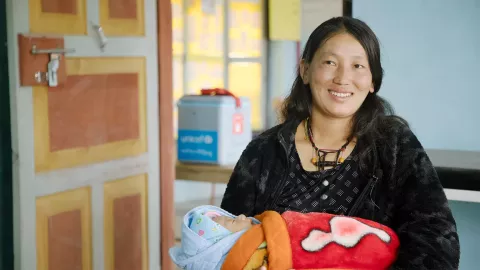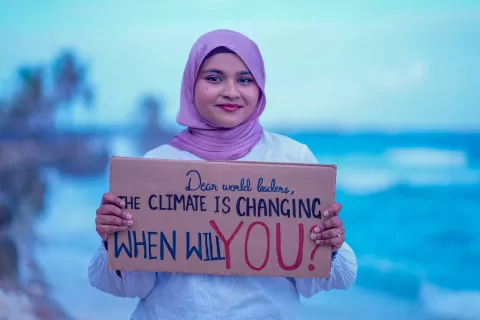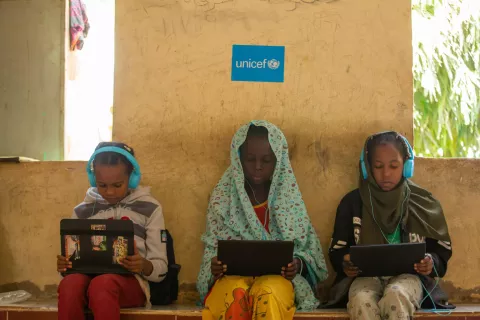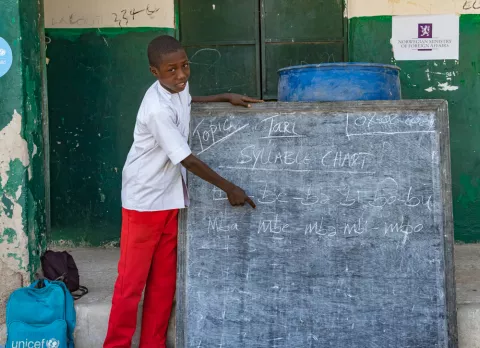How parents in India are keeping their girls in school, and away from early marriages
“As my daughters are getting educated, they don’t have to depend on others”

BIHAR, India – Imagine. You are a parent of four and you live in Bihar, one of the lowest income states in East India. As a child, you were lucky enough to go to school. But your family could not afford to keep you learning, so you were married off in your teens and dropped out.
Now, imagine. Your daughter’s future looks dramatically different than yours as a child. She has a brilliant opportunity ahead of her. She can complete her studies and pursue higher education. She gets a chance you never got: choosing what she wants in life.
Since 2018, this is becoming a new reality for girls in Bihar, ever since the Government of Bihar State introduced a new cash transfer programme. This programme supports families to fulfil their daughters’ rights, including getting a birth certificate, being immunized, receiving an education and not being married as children. From birth to age 21, girls receive INR 54,100 (approximately USD 760), with the largest sum transferred upon graduation to help them transition into adult life.
The programme is called Mukhyamantri Kanya Utthan Yojana, which loosely translates to “Girl Uplifting Scheme.” It is fuelled by a bold vision: transforming an entire generation of girls through universal access to basic services, from birth to adolescence.
The programme has no limitations based on caste, income or religion, which makes it truly universal.

Challenging cultural norms
Despite progress in recent years, 23 million girls in Bihar still face multiple obstacles. For many of them, everyday life is dire. Under-five mortality rates for girls are 16 per cent higher than for boys. Two in five girls drop out of school before they complete primary school, and two in five young women aged 20–24 are married before turning 18. When a girl is forced to marry as a child, her odds of finishing school decrease – while the odds of becoming pregnant in adolescence increase.
“[This programme] is proving to be a great initiative for some of the girls who want to get higher education without being pressurized by their family to drop out for an early marriage,” says Anisha, 18, a BA (Hons) student in Geography.
Not only that. Girls pursuing higher education set the example for the rest of the community, while challenging existing cultural norms. As Kulsum, 19, proudly says, “I know that my success will send a positive signal among our relatives and neighbours… [this programme] came as a ray of hope for girls like us who want to live their dreams but could not afford due to financial constraints.”
Parents also appreciate the added value of this programme, including the self-reliance that comes with education. One father, Bhola Rai, explains, “See, I have four daughters and I never earned enough to support their education, but it’s government schemes like this that keep our hopes alive. All my daughters got money for a bicycle, their uniform and education fees till Grade 8… As my daughters are getting educated, they don’t have to depend on others.”

Transforming a generation of girls
The programme launched in August 2018 and aims to reach 16 million girls every year. A family can register up to two girls, however there are no limitations based on caste, income or religion – which makes the programme truly universal.
UNICEF joined forces with the Government to map out existing interventions, analyze gaps, and launch a redesigned, comprehensive programme that addresses girls’ needs – from health to education, through child protection.
Addressing girls’ needs fulfils their rights – including their right to go to school. And women with secondary education may expect to earn almost twice as much as those with no education. In other words, if all adult women completed secondary education, the added financial value to economies globally is estimated to range between USD 15 trillion to USD 30 trillion globally.
Dreaming big is part of the picture, too. “I have always dreamt of bigger things in life and did not want to settle for small things,” says accounting student Kajal, 18. I want to establish my own accounting firm and provide employment opportunities to people. [This programme] will help the daughters of Bihar State to achieve their aspirations and empower them to dream big.”




